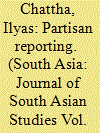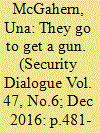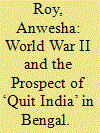| Srl | Item |
| 1 |
ID:
126171


|
|
|
|
|
| Publication |
2013.
|
| Summary/Abstract |
This study analyses the press reporting in India and Pakistan of Partition-related violence in 1947 and the unsuccessful attempts by the colonial authorities to censor provocative accounts in a context of administrative collapse. Assessing the extent of bias exhibited by the coverage, the study highlights the respective roles of the press and of rumours in spreading 'news' of the violence and so contributing to its cycle. The focus is on the tactics of all the sides involved which were designed to attribute responsibility to a hostile 'other', while playing down each community's involvement in violence as merely defensive. The study presents a modest contribution to the wider notion of the role of 'blame displacement' in reporting violence and the inability of what might be termed the transitional colonial state to control the press amid a general decline in governance.
|
|
|
|
|
|
|
|
|
|
|
|
|
|
|
|
| 2 |
ID:
149480


|
|
|
|
|
| Summary/Abstract |
This article examines rumour as a distinct type of speech act and makes a case for engaging with the spaces within which rumours are deployed and circulated in practice. Critiquing the rigid linguistic focus on speech acts within prevailing securitization theories, it follows insights from the fields of political geography and anthropology in order to incorporate voices from the margins more fully into its analysis of threat construction. Examining the local deployment and circulation of rumours in religiously mixed Arab localities in Israel, it argues that the perlocutionary force of rumour not only is rooted in local security and policing arrangements but reveals a spatialization of violence that is particular to the margins. In so doing, the article seeks to contribute to a broadening of the research agenda on the social construction of threat that would not only bring ‘security have-nots’ to the centre of its analysis but draw attention to the margins as a particular type of security space.
|
|
|
|
|
|
|
|
|
|
|
|
|
|
|
|
| 3 |
ID:
178154


|
|
|
|
|
| Summary/Abstract |
This paper studies the years 1940–42 in Bengal with a view to analysing the social fuel that made the Quit India Movement possible in the province. War-time colonial policies created multiple disruptions and intrusions in the lives of the people of Bengal, building up anxieties and mass discontent. Coupled with widespread rumours, this profoundly reconfigured the image of the colonial state. This paper attempts to tap into the psyche of colonised minds in Bengal in the early stages of the war, which began to question British invincibility in the face of serious reverses in Southeast Asia. When a potent mix of mass discontentment and rumour was combined with ‘revolutionary’ political activism in the countryside, it acted as an explosive catalyst, animating the Quit India Movement.
|
|
|
|
|
|
|
|
|
|
|
|
|
|
|
|